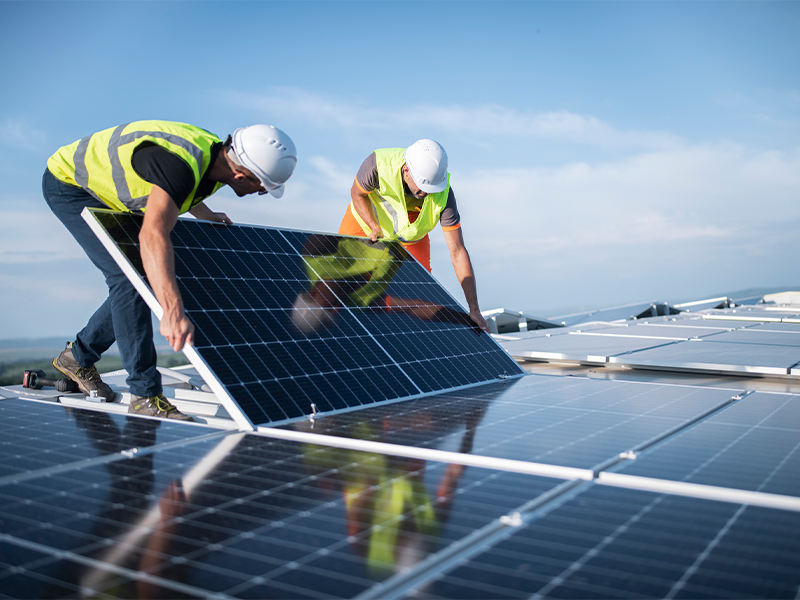Simply Solar Illinois: Illinois’s Provider for Reliable Solar Energy
Simply Solar Illinois: Illinois’s Provider for Reliable Solar Energy
Blog Article
Exactly How Solar Power Can Aid You Save Money and Decrease Your Carbon Impact
The integration of solar power into your energy profile presents an engaging chance for both monetary cost savings and ecological stewardship. By utilizing the sun's power, house owners can dramatically lower their monthly utility expenditures while likewise protecting versus the changability of future energy prices. Moreover, the shift to solar adds to a significant reduction in carbon emissions, straightening personal financing with more comprehensive environmental objectives. As different government motivations appear, the question occurs: exactly how can one successfully navigate the preliminary financial investments and recurring benefits of solar modern technology to maximize both financial and ecological gains?
Understanding Solar Power Financial Savings
While the shift to solar power typically involves an initial investment, understanding solar power savings is crucial for house owners and businesses alike. Solar energy systems can dramatically decrease electricity bills by taking advantage of the sunlight's power, equating into significant lasting monetary advantages.
In addition, solar power systems might qualify for numerous monetary incentives, consisting of tax obligation credit scores and discounts, better enhancing their cost-effectiveness. The availability of internet metering allows individuals to sell excess power back to the grid, producing an additional income stream. These aspects contribute to the general financial savings linked with solar energy.

In addition to guide monetary financial savings, solar power provides the added benefit of boosting residential or commercial property value. Houses equipped with solar panels are commonly more attractive to buyers, as they guarantee reduced power expenses - Simply Solar Illinois. Comprehending these components is essential for any individual considering solar power, as it highlights not just the potential economic gains, yet additionally the wider environmental and economic advantages of embracing renewable resource solutions
First Prices vs. Long-Term Perks
When assessing solar power, it is very important to consider the preliminary expenses against the lasting advantages. The upfront financial investment for photovoltaic panels, setup, and related tools can be significant, frequently varying from $15,000 to $30,000, depending upon the system size and home power requirements. This initial expense may deter some home owners; nonetheless, it is important to consider the possible cost savings gradually.
Once mounted, solar energy systems can considerably reduce or also eliminate month-to-month electrical energy bills, causing significant long-lasting financial advantages. Research studies show that home owners can conserve anywhere from $10,000 to $30,000 over the life expectancy of their planetary system, generally 25 years. In addition, numerous states use incentives, tax obligation credit ratings, and refunds that can offset preliminary prices, making solar more easily accessible.

Minimizing Your Carbon Impact
Lowering your useful reference carbon footprint is a crucial factor to consider in today's environmentally aware society, and embracing solar energy is among one of the most effective methods to attain this objective. Solar energy is a tidy, renewable resource that significantly reduces dependence on nonrenewable fuel sources, which are major factors to greenhouse gas emissions.

Moreover, the widespread fostering of solar modern technology motivates the development of environment-friendly tasks and supports innovations in energy storage space and effectiveness. The even more individuals and companies spend in solar power, the better the collective reduction in carbon exhausts, promoting a cleaner ambience for future generations.
Government Rewards and Discounts
Embracing solar energy not only benefits the setting but can additionally cause considerable financial savings, specifically with the accessibility of federal government incentives and refunds. Various government, state, and neighborhood programs are developed to motivate moved here homeowners and services to spend in solar power systems, making the transition more cost effective.
One of one of the most noticeable incentives is the Federal Investment Tax Obligation Credit Rating (ITC), which enables solar system owners to deduct a considerable percent of the installment prices from their government tax obligations. This incentive has actually been crucial in decreasing the in advance expenses connected with solar energy systems. Additionally, many states use their very own tax obligation credits, gives, and refunds that can better enhance financial savings.
Moreover, some city governments provide real estate tax exemptions for solar setups, making certain that property owners do not face enhanced real estate tax as a result of their renewable energy investments. Utility firms might likewise provide incentives, consisting of internet metering and feed-in tariffs, which allow solar power customers to offer excess power back to the grid.
Selecting the Right Solar System
Picking the proper solar this hyperlink system is essential for optimizing energy efficiency and economic benefits. The choice depends upon several aspects, including power requirements, budget, and available room. House owners ought to start by examining their power consumption to identify the system size required for optimum performance.
Following, consider the various types of solar technologies readily available. Simply Solar Illinois. Solar (PV) panels are one of the most common, transforming sunlight straight into power, while solar thermal systems concentrate on home heating water. Each type has distinct benefits depending on specific demands
Spending plan considerations are additionally extremely important. Initial installation prices can vary considerably, so it is essential to compare quotes from several companies and discover financing choices. Federal government incentives and rebates can additionally reduce the financial problem, making planetary systems more easily accessible.
Conclusion
In summary, solar energy offers a viable option for achieving substantial cost savings while concurrently minimizing carbon emissions. The first investment, though significant, returns substantial lasting financial benefits, with potential savings ranging from $10,000 to $30,000 over 25 years. Additionally, the ecological advantages of solar power add to lasting methods crucial for combating climate change. Government rewards enhance the feasibility of solar technology adoption, encouraging a transition towards a cleaner, much more economically efficient power resource.
Report this page